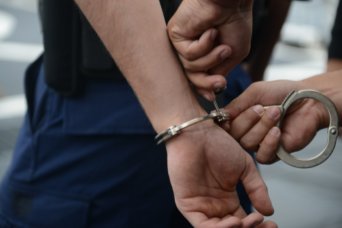- About
- Topics
- Picks
- Audio
- Story
- In-Depth
- Opinion
- News
- Donate
- Signup for our newsletterOur Editors' Best Picks.Send
Read, Debate: Engage.
| topic: | Rule of Law |
|---|---|
| located: | Russia |
| editor: | Igor Serebryany |
Moscow authorities' crackdown on the opposition reached a climax this week after the first group of activists was sentenced to various prison terms. Hundreds more have been expecting the courts' verdicts with little hope for acquittal.
These snap trials show that the regime takes the protesters seriously and is not going to play softly until at least 2024, the year of the anticipated transition of power in the Kremlin. During the mass rallies held in July and August, police have arrested over one thousand demonstrators, most of whom have been investigated under the Criminal Code's articles of "attacking state officials" and "calls to overthrow the Constitution".
While the prosecutors said the suspects "had been attempting to undermine the Constitution", a grave accusation under the existing anti-extremism law, the defendants insisted they were acting to protect the Constitution from being usurped by Putin's regime. For instance, the Constitution guarantees the citizens a right to convene peacefully with no need to apply for permission to gather. That clause has been at stark contradiction with the practice of the authorities ever since the early years of Vladimir Putin's presidency.
One of the defendants was sentenced to two years in a labour camp for "touching a policeman's hand". Another one will spend the next five years behind the barbered wire for "inciting hatred against police" in his Twitter account. The third one got three years for spraying pepper spray toward the police line. The prosecutors' reference to the Constitution seems mockable in Russia, where its principal law has been routinely violated by the police – a fact openly admitted by the law enforcers themselves.
In sharp contrast with the Russian judicial practice where the investigations and court hearings may last for years, this time the Investigative Committee completed its work within a few days and the courts have made their rulings at the speed of light. This was because the judges did not bother to thoroughly weight the arguments laid forward by parties: their decisions were pre-cooked, local observers say.
They point out that the prosecutors did not use the notorious article "participation in mass disorders" of the Criminal Code as it used to happen after anti-Putin riots in 2012 but opted to accuse the suspects of "extremism" instead. "This is because in order to prove one's participation in disorders, an investigator has to find solid evidence that the person had been "in the wrong place at the wrong time doing something wrong".
Meanwhile, to accuse a person of extremism, no evidence is needed at all: extremism, according to the Russian law, is a thought crime rather than a physical wrongdoing", head of the Russian bureau of the International Human Rights Society Vladimir Novitsky says. He adds that "extremism" is a crime more grave than "participation in mass disorder" under the Russian Criminal Code.
"Russian laws describe extremism so loosely that any investigator can charge any citizen of that crime without even leaving his office", Novitsky says. Earlier this week, a Moscow independent journalist Ilya Azar was arrested in his apartment's bloc and taken by the police, while his baby daughter was left in the flat unattended. Azar was detained following his participation in an opposition march on August 31. Investigators don't discriminate between the acts of physical disordering and ideological opposition to the regime, a lawyer Valery Chernikov adds. "A person could attack a policeman under the influence of the aggressive "crowd spirit" with no revolutionary intentions in mind. Alternatively, he or she could throw paper cups to the police in riot gear because the police is a symbol of the oppressive regime.
"In both cases, the person committed a crime for simply attending an event not approved by the authorities, which, according to the law, manifests extremism by itself", he explains. Russian establishment has lately been paranoid over the stability of the country's political system. In late August, the parliament, State Duma, held an emergency meeting over the alleged involvement of the Western "instructors" into the steering opposition rallies in Moscow.
